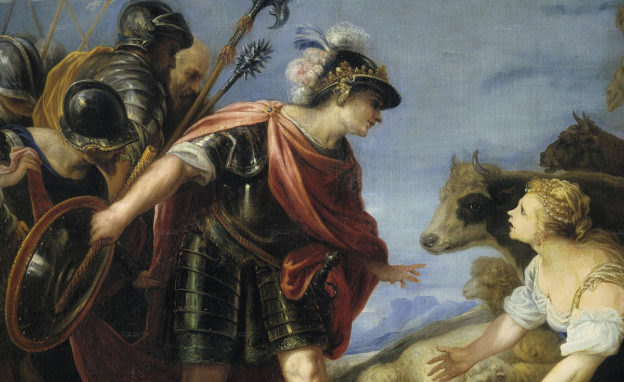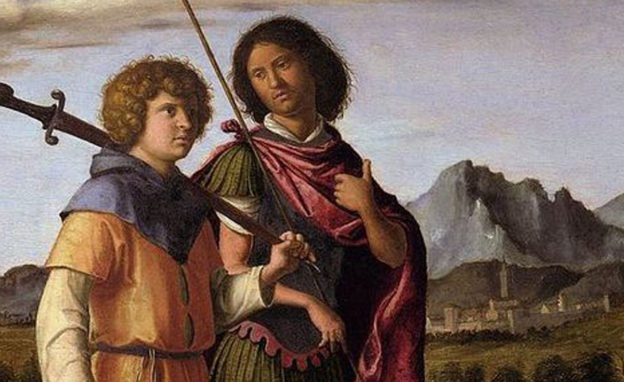When things do not go our way, we often see red. We want to lash out and repay the hurt, rather than trust in God to put right what was wrong. While our desire for justice is sometimes well placed (sometimes our desire for justice is more like selfishness), our desire for personal vengeance is not.
While David showed great restraint in not killing Saul in 1 Samuel 24, his rush of blood to the head at the slight of a rich fool shows he still had learning to do. Thankfully, God restrained David from sinful overreach, and ensured he and his men were provided for through the hands of Abigail, the rich fool’s wife (and a wise servant). This example reminds us to wait on God for justice when we are slighted, for God will surely bless his people.
Our passage begins with momentous news that passes as a footnote: the death of Samuel (v.1). The prominent character of the early part of 1 Samuel has passed from view, and now from death to life. All Israel mourned his passing, though David likely mourned remotely.
David and his men moved to the wilderness of Paran in Sinai (v.1). There David and his men became neighbours of a rich, money-obsessed fool whose “harsh and badly behaved” nature was contrasted by Abigail, his wife’s discernment and beauty (vv.2-3). Oh, and his name was Nabal.
David politely requested from Nabal’s great abundance of riches provisions for his men, considering they had not done the usual parcel of rogues thing and seized for themselves (vv.4-9). In fact, they had protected Nabal’s workers and helped enrich Nabal in the process (vv.14-16).
Sadly Nabal was too busy counting his coins to see it that way, and rudely dismissed David’s request with a slight, suggesting he was some lowly runaway deserving nothing (vv.10-11). Bad call! David’s men reported it to David, who decided it was time to sort Nabal out permanently (vv.13-14).
Yet God had other ideas. David could not show restraint to the king, and happily wipe out a commoner. So God ensured word reached Abigail’s ears via a sensible servant, who could see the trouble Nabal had made himself (vv.15-17).
Abigail herself sought to put things right in a hurry. She threw together a feast for David and his men, not telling her foolish husband, and raced to meet the growling David approaching to wipe out Nabal and his men for slighting his goodwill (vv.18-22).
Once there, Abigail appropriately acknowledged the future king, took Nabal’s guilt on herself, and argued for leniency for her worthless fool husband (vv.23-5). Importantly, she spoke as God’s instrument to point out to David he would regret taking vengeance into his own hands, instead of trusting God to punish Nabal (vv.26-31). After all, David was acting out of wounded pride, not as a wise judge.
David confessed that God had sent her in good time to restrain him from a terrible wrong (vv.32-4). After the two parted amicably, Abigail returned to her foolish husband drunk as a skunk (vv.35-6).
The next morning, Abigail told Nabal how she had saved his skin (v.37). His heart failed him, and ten days later God struck him down (vv.37-8).
David might not fully understand restraint, but he was not entirely a fool. As soon as he heard Abigail was newly widowed, he sent his men to propose marriage (vv.39-42). Thus two were blessed by God. David, by God-imposed restraint and a godly wife to replace Michal, whom Saul had remarried off (v.44). Abigail, by marriage to a future king who appreciated her beauty and discretion, and listened to her!
That said, David’s restraint did not extend to monogamy: he also married Ahinoam of Jezreel (v.43). But that would be a problem for another day.
God providentially acted to restrain David from unjust vengeance on a fool, something that would have been a terrible sinful overreach. Like David, we too need to wait on God to dispense justice, not take it on ourselves just because we can. Like David, we can rest in God’s assurance of his justice, but also that he has and will fulfil his promises to us which are far greater than any earthly gain we might lose, or lose out on.
God’s providential hand stretches further in this chapter, though. David would happily have killed Nabal and carried the stench of vindictive revenge to the throne, if not restrained. Samuel, whose death in verse one gained passing mention, was too prone to picking “electable” kingly candidates (chapter 16).
Thank God that in his providence, he sent Jesus to secure our salvation for us. Even godly servants fall short, but not Jesus. Jesus understood that the road to the Kingdom meant suffering his own injustices and hostility despite his perfect life. Even now, Jesus patiently awaits the hour of final judgement that more sinners will be saved.
Through considering Jesus, we will not grow weary or fainthearted (Heb. 12:3), and learn restraint.




